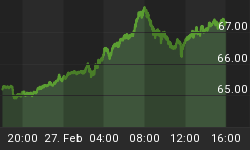In "The Coming Collapse of the Dollar," James Turk and I said this about the effect of a falling dollar on other countries:
Recall that the only reason Japan or Europe can generate even their current meager rates of growth is the willingness of U.S. consumers to buy their Hondas and BMWs. As the dollar plunges, Japanese and European goods, priced in suddenly-appreciating currencies, will become prohibitively expensive for U.S. consumers, who will respond by buying U.S.-made alternatives or nothing at all. Correctly interpreting this change in buying patterns as a threat to their vital export sectors, European and Japanese leaders will respond with the only weapon they have left: monetary inflation. They'll cut interest rates and buy dollars with their currencies, flooding the world with euros and yen the way the U.S. now floods the world with dollars. The result of these "competitive devaluations" will be a death spiral for all major fiat currencies, in which European or Japanese bonds will fare as badly as their U.S. cousins.
This week the markets got a glimpse of how the competitive devaluation story might play out, as Europe confronted the impact of a "strong" currency. For the past few years, the European Central Bank has shown admirable restraint, raising rates in response to a surging money supply and allowing the market to set the value of the euro. This in turn has caused the euro to soar against the dollar, testing the premise that a system as fragile as Old Europe can't tolerate an appreciating currency for long. And sure enough, France has begun lobbying for -- get this -- the right to vote on European Central Bank interest rate policies. From Bloomberg:
Trichet's Rebuke of French Government Widens Rift With Sarkozy
July 19 -- Jean-Claude Trichet's rebuke of a French demand for a greater voice for governments in setting interest rates deepened a rift with President Nicolas Sarkozy.
"Such declarations are not acceptable," European Central Bank spokeswoman Regina Schueller said yesterday on behalf of Trichet. "The president of the ECB repeats with gravity that any attempt" to influence the ECB violates the European Union's founding treaty.
Sarkozy has complained that the Frankfurt-based central bank's eight interest-rate increases since late 2005 have driven the euro to a record, threatening European exports. While Sarkozy has retreated from a challenge to ECB independence, he said last week he and Trichet are not "on the same wavelength."
"For Trichet, more lobbying from the French government undermines the credibility of the ECB and that's what worries him, which is why he's hitting back," said Julian Callow, chief European economist at Barclays Capital in London. "The battle will get more intense as the euro continues to rise."
The euro rose 0.2 percent yesterday to $1.3810 at 6:11 p.m. in Paris, retreating from a record of $1.3833 set earlier. It's up almost 5 percent this year and 55 percent since the end of 2001.
Sarkozy has criticized the bank's exclusive focus on inflation, and Trichet has questioned Sarkozy's tax cuts that would violate a French pledge earlier this year to reduce the nation's budget deficit.
Trichet's European Central Bank won this early skirmish, of course. By law the ECB is independent, so a frontal assault by France or any other European country isn't going to succeed -- at first. But anyone who thinks the Eurozone welfare states will maintain their composure with the euro at, say, $1.50, simply doesn't understand how democracy works in this late, decadent stage of its evolution. If the dollar keeps falling against the euro -- as market forces pretty much guarantee that it will in the absence of major intervention -- the euro system will have a nervous breakdown. Under pressure from exporters no longer able to sell to U.S. consumers, member governments will change the ECB charter and force it to cut rates, or they'll start opting out of the common currency, or they'll adopt wildly inflationary tax-and-spend policies designed to offset the rising euro.
However it plays out, the result will be a world in which competitive devaluations drive the price of all the major currencies inexorably towards their intrinsic value, which is the paper on which they're printed. But it might be a while before most people notice. As surreal as this sounds, if the major fiat currencies are falling more or less in tandem, to unsophisticated eyes they'll continue to appear to be stable. That's been the case for the past few years, with the prices of oil, gold, healthcare and food soaring (which is another way of saying that paper currencies are plunging) while mainstream analysts proclaim inflation low and many of the world's currencies "strong."
But as this process accelerates, the fiction of strong and weak currencies will be harder and harder to sell. Inflation will migrate from "good" things like houses and stocks to life's necessities, and the link between prices and the unit in which prices are expressed will become clear to everyone. Then the death spiral begins.
BUY GOLD AND SILVER ONLINE AT GOLDMONEY















